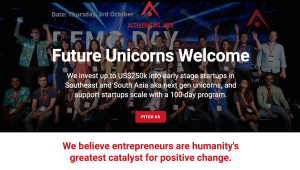
You have a startup idea that’s been vetted by your audience but doesn’t have the resources to make it a business yet. Where do you go if you need seed money the advice to give shape to your business idea or if you’re hard-pressed by this incessant desire to take your MVP (Minimal Viable Product) to the next level?
You may have heard of Incubators and Accelerators, but what do they do exactly?
What Is The Difference Between An Incubator And An Accelerator?
Incubators provide entrepreneurs with an environment to nurture their startup idea and Accelerators (as the name suggests) accelerate the growth of existing companies with a Minimum Viable Product (MVP). The role of an Incubator ends when a startup has a solid business idea or product to present to investors or potential customers. Accelerators design programs for specific months where entrepreneurs receive mentoring and funding for their businesses.
To be honest, rarely do startups get interest from investors based on an idea, an MVP is the pull.
Let’s understand the importance of an MVP.
A minimal viable product is the basic version of a product or service that a company intends to market. By offering a basic version, companies want to ascertain the acceptance of the product or service from prospective customers.
There are many challenges for new entrepreneurs in any field – the what, why, when, and how must be addressed. It’s not easy for someone who is starting for the first time. It can be overwhelming, ng particularly at a micro-level. Startups have to bootstrap and may not have the ability to manage many of the costs involved in starting up by themselves. Therefore, the resources – services, processes, and infrastructure, provided by Accelerators and Incubators, that help startups reduce costs are particularly important. Startups save money on office space and shared skills offered by these entities. Incubators and Accelerators are both important to the startup ecosystem. They can be private organizations or government bodies.
What Role Do They Play For Startups?
Role of an Incubator
What can an Incubator do for your startup idea?
This question isn’t as simple as it sounds, so some background information might help. The first business Incubator was founded in 1959 in Batavia, New York. The Batavia Industrial Center provided short-term leases, shared office supplies, management consulting, and secretarial services to a wide range of businesses, including ones that were incubating (hatching) chicks. The similarity between raising young chickens and supporting small businesses has led to the use of the term “Incubator” to describe business models.
However, the concept of sharing resources between startups did not spread until the 1980s. Since then, the term business Incubator has expanded to incorganizationstions that provide a variety of resources. This can make it more difficult for startups to find the right Incubator.
EntreprMagazinegazine defines an Incubator as an entity accelerating the growth and success of entrepreneurial companies through a variety of business support resources and services, such as physical space, capital, training, shared services, and network connectivity. It is defined as a ‘design organization’.
Some Incubators select entrepreneurs through an application process, while others only work with past companies or entrepreneurs from their network. Certain Incubators focus on specific areas e.g., women entrepreneurs, social enterprises, businesses in specific see, actors, etc. Incubators often also target startups in geographic locations.
Alternatively, they tend to require attendees to relocate indefinitely to coworking spaces and local communities. Entrepreneurs can gain plenty at an Incubator by interacting with other entrepreneurs, validating ideas, capturing feedback, and creating business plans. Intellectual property and legal issues are also considered and addressed. The Incubator process usually takes months and ends with a presentation by the entrepreneur to the incubator community and investors.
Popular Incubators in Asia

Venture Catalysts is a full-service incubator that provides investment, mentorship, and networking opportunities. The investment size is between $200,000 to $2 million and is sector agnostic
- Country: India
- Founded: 2016

The 10,000 Startups Incubate ‘Warehouse’ program provides co-working space, mentorship, and networking opportunities for tech startups. Each warehouse is funded by the respective State Government. If you wish to opt out of the physical space option, you can apply for virtual incubation.
- Country: India
- Founded: 2013

X21 Digital helps blockchain projects succeed by incubating, advising, funding, and supporting them.
- Country: Singapore
- Founded: 2020
Role of an Accelerator For Your Startup Idea
The first business Incubator may not be well known today, but the first business Accelerator is certainly well known. Y Combinator (aka “YC”) was founded in Boston in 2005 and soon moved to Silicon Valley. YC chooses a group of startups called “collections,” who participate in an intensive 3-month program that ends on “Demo Day.” These startups want to impress other investors who may finance them. YC serves as a model for many other accelerators, and the general model is the same in many industries – an application process, cash and stock investment, extended programs including mentoring, investor networking, demonstration, days and events organize a dinner where entrepreneurs with their teams meet successful entrepreneurs and business leaders. Many other accelerators follow the YC model.
The design of each acceleration program is different, but the goal remains the same – to accelerate the rate at which the business moves forward. Accelerators provide startups with funding, skills, resources, and a roadmap.
Popular Accelerators in Asia
Brand Capital GSV
BC-GSV runs a 15-week accelerprogramramme that provides access to mentorship from leaders in India and Silicon Valley. Apart from this it also provides media investment through the Times of India Group, which makes it unique from other accelerators.
- Country: India
- Founded: 2016

The Programme is designed for tech companies in Web3. It offers Technical Mentorship, Community building, Product strategy, and Funding.
- Country: Singapore
- Founded: 2018

Accelerating Asia is an early-stage venture capital fund focused on Southeast and South Asian pre-Series A firms. It invests up to US$250k.
- Country: Singapore
- Founded: 2018

Primer selects entrepreneurs, invests seed, funds, and provides them with mentoring and other support services to help ensure successful outcomes.
Primer invests in start-up teams in fields such as consumer/internet technology, software, healthcare, and HW&SW convergence.
- Country: South Korea
- Founded: 2010
Conclusion: What Works Best For Your Startup Idea?

(universitylabpartners.org)
Before you decide what best works for your startup idea, keep in mind that several parameters will help you decide –
Does the entity have a track record of success stories in your sector?
The size of the initial investment and the structure of the deal.
Is the entity geography-specific?
The team, the network, and the infrastructure.




